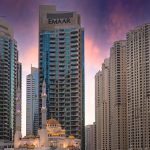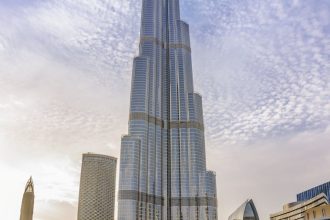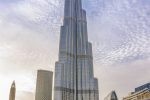Post‑Oil Boom – What’s next for the UAE’s economy?
The UAE’s transition from an oil‑centric economy to a diversified, knowledge‑driven powerhouse began decades ago, yet the momentum is only accelerating. As global energy landscapes shift and domestic consumer habits evolve, the nation has identified key sectors that will drive sustainable growth, create high‑value employment, and fortify its international standing. In this feature, we highlight the top sectors deemed “must‑have” for the UAE’s post‑oil future, unmasking the forces shaping them, the policies backing them, and how they fit into the broader societal agenda.
—
1. Renewable Energy: Powering a Sustainable Future
Why Renewable Energy Matters
The UAE’s iconic desert landscapes and abundant sunshine make it a perfect candidate for solar power. The Horizon of R&D, coupled with federal ambition—like the Federal Vision 2030—positions renewable energy as a cornerstone of national resilience.
– Singapore‑style grid decentralisation: The government’s Solar Energy Programme (SEP) aims for 5 GW of solar capacity by 2025 (Dubai Municipality, 2023).
– Carbon neutrality targets: The UAE pledged to reduce emissions by 23% by 2030 (UAE Ministry of Climate Change and Environment, 2022).
– Economic diversification: Renewable projects produce employment in installation, maintenance, and research; projection is 20,000 jobs by 2025 (Dubai Economy, 2023).
Key Investor Opportunities
– Face‑to‑face collaboration: Partnerships between UAE public entities and international developers (e.g., ACWA Power, Ørsted) showcase project models that blend local knowledge with global expertise.
– Financing frameworks: The UAE’s financial institutions now offer green bonds, backed by the Emirates NBD and the Emirates Insurance Group, aligning capital flows with sustainability.
—
2. Tourism and Hospitality: The Gulf’s New Crown
Tourism’s Post‑Oil Resilience
Dubai’s towering skyline and hospitality brand have long intrigued the world. Yet Dubai Tourism, after the temporary downturn due to global crises, reiterated an aggressive strategy to become a destination of choice by 2030.
– World Tourism Boom: The UNWTO projects a 25% YoY increase in tourism revenue through 2030 (UNWTO, 2023).
– R&D in theme parks: The UAE’s planned $10‑billion mixed‑medium recreation complex in Sharjah (RERA, 2023) signals a pivot to experiential tourism.
– Diversified experiences: Cultural heritage sites, desert safaris, and smart city tours form a layered offering that appeals to both local and foreign markets.
Service Productivity
– Training programs: The Knowledge and Human Development Authority (KHDA) collaborates with local colleges to upskill the tourism workforce.
– Technology integration: Smart apps for navigation, contactless services, and real‑time customer feedback are becoming the norm.
—
3. Health & Life Sciences: From Clinical Care to Innovation
Expansion of the Healthcare Ecosystem
The UAE’s Vision 2030 outlines a goal to become a regional health hub. The government’s commitment is reflected in massive capital infusions and policy reforms.
– Medical City & Innovation Hub: Dubai Healthcare City (DHCC) has a projected value of AED 55 billion over the next decade (DHCC, 2022).
– Pharmaceutical manufacturing: The Federal Government’s Plan for 2030 earmarks AED 10 billion for research facilities (UAE Ministry of Health & Prevention, 2023).
– Digital Health Credits: The MoHAP’s Digital Health Initiative incentivises telemedicine and AI diagnostics (MoHAP, 2022).
Job Creation & Talent Migration
– Clinical research: Over 2,000 positions anticipated in clinical trials & generics (Dubai Health Authority, 2023).
– Bio‑innovation cluster: The MaNAD (Dubai Health Authority) is partnering with the UAE University to establish a life‑sciences incubator in the northern Emirates.
—
4. Advanced Manufacturing & 5G‑Enabled Industry 4.0
Manufacturing Revival
The UAE’s government launched the Industrial Competitiveness Programme to upgrade SME capabilities and promote on‑shore production.
– Smart factories: R&D labs, CNC factories, and additive manufacturing units are multiplying in Abu Dhabi’s Sustainable City.
– Export‑orientation: The Department of Economic Development announced a $3 billion incentive package for high‑tech exports.
5G Infrastructure & Digitalization
– Broadband rollout: 5G coverage now available across key economic zones (Dubai Telecom, 2023).
– Digital twins: The UAE’s “Smart Dubai” initiative leverages 5G for real‑time data analysis and predictive maintenance.
These technologies help firms reduce lead times, cut production costs, and open new market segments, directly influencing the GDP composition.
—
5. Logistics & Supply Chain: The Arabian Gateway
Strategic Connectivity
The UAE’s geographic positioning and port infrastructure render it the hub for intra‑Middle East freight. Dubai’s Jebel Ali Port remains the region’s busiest container container terminal.
– JDW (Jebel Ali Development Authority): By 2025, JODC expects a 10% increase in container throughput (Dubai Ports, 2023).
– Free zones: Dubai Logistics Unlimited and the SHOARE Free Zone aim to attract global freight logistics firms with 100% tax exemption zones.
Technological Integration
– AI‑based logistics tools: Implemented at Dubai Customs in “X‑Connect” to streamline clearance processes.
– Drone‑based delivery pilots: Conducted by Emirates Airlines Under the Dubai Logistics Council’s oversight (DLH, 2024).
—
6. Food‑Tech and Agriculture: Feeding the Kingdom
Food‑Security Drives
The Ministry of Climate Change and Environment’s Food Security Initiative 2030 underlines increased domestic food production.
– Vertical farming initiatives: The UAE’s Redstones Farm in Abu Dhabi uses 70% less water and 80% fewer pesticides (Redstone, 2025).
– Precision agriculture: Satellite‑based yield monitoring integrates with AI to maximize output.
Market Size & Growth
– Projected CAGR of 8.5% for the UAE agri‑tech sector, spurred by foreign investment (World Bank, 2023).
– Export radius: Country grows beyond local sales, exporting processed produce to the Gulf Cooperation Council (GCC) region.
—
7. Fintech & FinTech‑Enabled FinServ: Digital Banking Takes Flight
Regulatory Clout
The UAE has positioned itself as the fintech centre of the Middle East by adopting progressive regulations.
– KYC & PSD2 compliance: MIRWAL (Commercial Capital) extends digital‑camps for FinTech startups.
– Sandbox: U.A.E. free zone, Leverage for early-stage fintech to test on a regulated environment.
Emerging VC and Investment
– Venture funds: Emirates Equity Ventures (EEV) earmarked $250 M for fintech and digital infrastructure projects by 2025 (EEV Annual Report, 2023).
– Open banking API: Dubai Finance, under the Department of Economic Development, aims to create open financial data.
Employment Landscape
– Job creation: Fintech projects create a hybrid workforce of developers, data scientists, and risk analysts (FinTech Emirates, 2024).
—
8. Education & E‑Learning: Building the Knowledge Workforce
Education Sector Vision
– UAE Knowledge Economy Vision 2030 emphasizes a shift towards knowledge‑based economy and higher education output.
– MOE Talent Roadmap 2022: Establish 10 new STEM universities by 2030 (MOE).
Digital Learning Platforms
– EdTech Startups: Bayzat and Edraak expand across the Gulf with AI‑driven personalized curriculum plans.
– Certificate of Skills (CoS): Implemented by the UAE Ministry of Education; a partnership with the London School of Economics to deliver micro‑credentials.
Workforce Training
– Vocational training reforms: The Ministry of Labor & Social Affairs announced a 20% slant towards vocational cells for tech and green skills (2023).
—
9. Cultural & Creative Industries: The UAE as a Global Cultural Node
Creative Economy Policies
– Creative Hub Initiative: The Dubai Cultural Framework encourages co‑creation across film, music, and design sectors (Dubai Culture & Arts Authority, 2022).
– Dubai Media City: Attracts global studios, with a 40% increase in film projects by 2025 (Dhery, 2023).
Global Brand Building
– International art fairs & festivals: Ma‘dan and Abu Dhabi Global Market promote global exhibitions, adding value to the tourism sector.
—
10. Smart City & Urban Development: Building Future‑Proof Cities
Governance & Implementation
– Smart Dubai Vision 2025 aims to integrate IoT, AI, and blockchain into public service delivery.
– Dubai Smart City Master Plan: Facilities like the Dubai Future Accelerators pilot digital governance solutions.
Environmental Impact
– Carbon footprint modeling: Projects emphasise net positive construction, green roofs, and waste‑to‑energy solutions.
Employment & Innovation
– Skill transformation: Drivers of technology adoption, creating roles in smart infrastructure, data analysis, and digital policy.
—
11. Investment & Market Dynamics: How To Benefit
Policy Incentives
– Free‑zone tax waivers.
– One‑stop‑shop procedures for business licensing (DED).
– Repatriation of profits for foreign investors.
Funding Options
– Government‑backed funds such as the Investment Corporation of Dubai and Abu Dhabi Investment Office sponsor high‑tech ventures.
Risk Mitigation
– Transparent legal frameworks (The UAE Civil Code) and the UAE Commercial Companies Law secure intellectual property and contractual rights.
—
12. The Path Forward: Aligning Vision 2030 With Market Realities
The UAE’s post‑oil economy is a field of opportunity rather than a threat. The sectors listed above are not simply trending; they’re back‑ed by concerted government strategies, strategic geographic advantages, and a genome of skilled talent. While oil remains a revenue stream, the national strategy vests in diversified growth engines that carry cross‑sector synergies.
Key Takeaways for Businesses & Investors:
1. Align with Vision 2030 — Identify how your project dovetails with the Federal Vision 2030.
2. Leverage the Free‑Zone Ecosystem — Capitalise on tax incentives and ease of doing business.
3. Adopt Sustainable Practices — Modern investors judge operations through ESG lenses.
4. Build Local Partnerships — Knowledge of the local market and compliance with regulatory frameworks.
5. Invest in Talent Development — Workforce skill gaps in high-technology sectors can be a critical bottleneck.
—
About Certidor.com
Certidor.com is an independent UAE‑based digital platform dedicated to delivering well‑researched, fact‑checked, and reliable content on business, lifestyle, and societal trends. Our mission is to help residents, expatriates, and business professionals stay informed through content sourced from reputable UAE authorities, international bodies, and industry experts. We do not provide legal, medical, or financial advice, and any information presented is for general informational purposes only.









